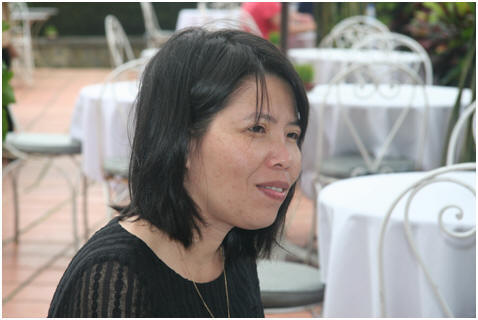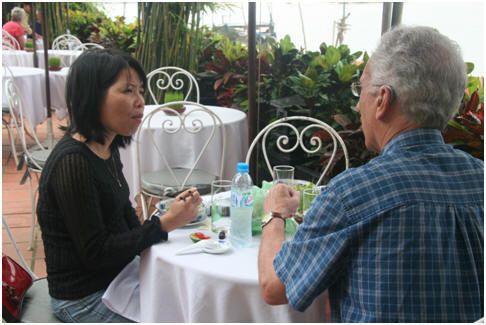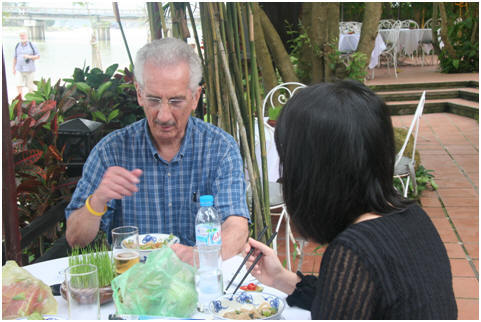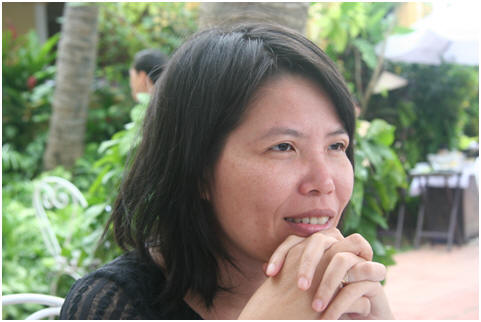|
We left Hanoi and flew south to Hue. It was the old imperial
headquarters of the kings of Vietnam. Americans of my age remember
Hue as just another city in Vietnam that was attacked in a large
military offensive, which started in January 31, 1968. While the
Tet Offensive didn't contain a victory on the part of the North
Vietnamese, it did rattle the American troops. It was an early
indication that our military and/or our political involvement in
Vietnam were not going to be successful. Thao and the driver got us to the hotel, the Imperial Hotel, in Hue. The Imperial was the largest and the only 5-star one in the region. I don't know why we lucked-out in such a luxurious hotel. It was one of the best hotels that we have ever stayed at in all of our travels overseas. The next morning, Thao was there at 8:30 in the morning for a riverboat ride down the Huong (Perfume) River. Then we visited the pagoda. Then Thao said that we were having lunch at her home. Her mother was preparing a 9-course meal for us. That impressed me that we were eating at her home, but then we discovered that she was a direct descendent of King Dong Khanh. We had obviously moved up in our social world; we were being lead around Hue by a part of the ancient royal family of Nguyen. During our tour, we got into a discussion about education since I taught at the college level back in the States. I mentioned the importance of education away from one's own homeland. I told her that I always mention to my students that they, sometime in their academic careers, need to go to Europe or somewhere else to further their education. I told Thao that if I were teaching her children in Vietnam, I would encourage them to travel beyond the borders of their homeland also. I added that she should encourage her children to broaden their educational base by getting some of their colligate education in the States or Europe.
Our discussion continued for the entire time that we were together during our nearly four days in Hue and Hoi An. During our time together, either she or I would elude our running discussion. Thao kept agreeing about the importance of education outside of one's own country but insisted that that was beyond her grasp. My pleasant but firm retort was that while finances were involved, the cost would be overridden by the value of the educational experience to all involved. Yes, it would cost x-number of dollars or đồngs, but the cost would be made-up for by the added educational value and Weltanschauung (worldview) of the person who went beyond the borders of their country. In one of our verbal exchanges between us, she mentioned in passing that she and her husband had gone to Seoul, Korea for 4-months to further their education in traditional music. With that comment, I choose to use her comment to show that my stand was correct. Thao's quick retort was that she and her husband went on a scholarship. They didn't have the money for even that educational experience.
The first reason is that schools will assist students due to lack of financial means. Most American students get at least partial aid because of both the cost of education and the lack of most American families to afford the financial drain upon them. She and her husband received a scholarship to their educational opportunity in Seoul for expressly that same reason.
One of the subjects that I teach in the States is history. In one of the courses, we deal with the Vietnam War. While textbooks are critical to the understanding of the American mistake and involvement in that war, having someone who grew-up during that time or whose family was directly affected by the war adds far more to the total picture. Actually, that is why I was in Vietnam myself. I know the Vietnamese people a lot better having spent a couple of weeks in Vietnam than I could have ever learned from an emotionally shallow history of the war, the battles, and the dates. In fact, that is precisely why I travel all over the world many times-to get a more complete Weltanschauung for teaching. Americans have a problem of being isolated in between two massive oceans. Since we are nearly totally isolated from the real world except for some Canadians and Mexicans, we need to know other places and people. Had we known what I have discovered about the Vietnamese in two weeks, it could have saved the lives of nearly 60,000 Americans and 1.5 million Vietnamese. That isn't an exaggeration. Had our government and military learned about Vietnam, the lives of millions of people would not have had to suffer needlessly. Either the Vietnamese have become one of the nicest and most cordial people of the world since the end of the war, or they are just that way naturally in spite of the war. Before meeting the first Vietnamese, I was apprehensive about being from America and being the age of one that could have fought there. I was in college, graduate school in the States, and in Scotland during much of the war. However, no Vietnamese had a copy of my résumé. Yet, they are about the most pleasant people that I have ever met in all my travels. Their attitude about strangers isn't an act that they put on...it is real and sincere. We need to learn that lesson about people and stop our McCarthyism about people who aren't into democracy and freedom as we mistakenly assume we are. After much debating with my friend and guide, we had to say goodbye. We would soon be in Ho Chi Minh City, then onto the Mekong Delta, and then on to Cambodia, Laos, and Thailand. We sat for lunch and said our goodbyes. I added that I wouldn't have been on this trip had it not been for an educational disappointment. I told her about getting hired at a university that I had been an adjunct for over a decade. However, after a fall while painting my deck on my house and cracking head, the university didn't want to wait to find out whether I was alright by either asking me or my neurosurgeon. They wanted someone to start in the fall, and they weren't interested in finding out my condition...which was complete recovery. I taught for them at the same time that I would have had they not hired the next candidate. That disappointment was a blessing in many ways. Most importantly, it freed me to plan a 5-week trip to Indochina and Thailand. And had I not taken that trip, I would have missed meeting Thao. I told her that our trip to Vietnam and especially Hue was worth the disappointment that I had suffered with my job. We all have to look for doors that open when other doors are abruptly closed.
|







 That little
exchange began a pleasant argument over the value that I placed upon
overseas educational experience for all students. Thao agreed that
it would be good for them, but they couldn't afford it. My response
was to set that as a goal for her children and also for her and her
husband to travel and/or to further their education beyond the
borders of Vietnam. If the goal is set, chances are, it would
probably happen.
That little
exchange began a pleasant argument over the value that I placed upon
overseas educational experience for all students. Thao agreed that
it would be good for them, but they couldn't afford it. My response
was to set that as a goal for her children and also for her and her
husband to travel and/or to further their education beyond the
borders of Vietnam. If the goal is set, chances are, it would
probably happen. Never to
be discouraged, I responded that scholarships abound in America for
overseas students. I assured her that her family would be able to
get a scholarship precisely the same way that she and her husband
had in Seoul.
Never to
be discouraged, I responded that scholarships abound in America for
overseas students. I assured her that her family would be able to
get a scholarship precisely the same way that she and her husband
had in Seoul.  However,
American universities and colleges are looking for overseas students
for the betterment of the education of the entire student body; that
is the second critical reason. Overseas students bring to American
educational institutions another Weltanschauung to the campus.
Textbooks are needed, but the person from overseas brings something
that is both needed and appreciated by both the school and the
student body.
However,
American universities and colleges are looking for overseas students
for the betterment of the education of the entire student body; that
is the second critical reason. Overseas students bring to American
educational institutions another Weltanschauung to the campus.
Textbooks are needed, but the person from overseas brings something
that is both needed and appreciated by both the school and the
student body.  Why Hue? The answer is that it is important to learn things that we
have been missed in life. Thanks, Thao, for opening a large door to
my understanding. I hope to see you, your husband, and/or your
children in America soon-I hate losing an argument especially one
that lasted several days in Vietnam.
Why Hue? The answer is that it is important to learn things that we
have been missed in life. Thanks, Thao, for opening a large door to
my understanding. I hope to see you, your husband, and/or your
children in America soon-I hate losing an argument especially one
that lasted several days in Vietnam.